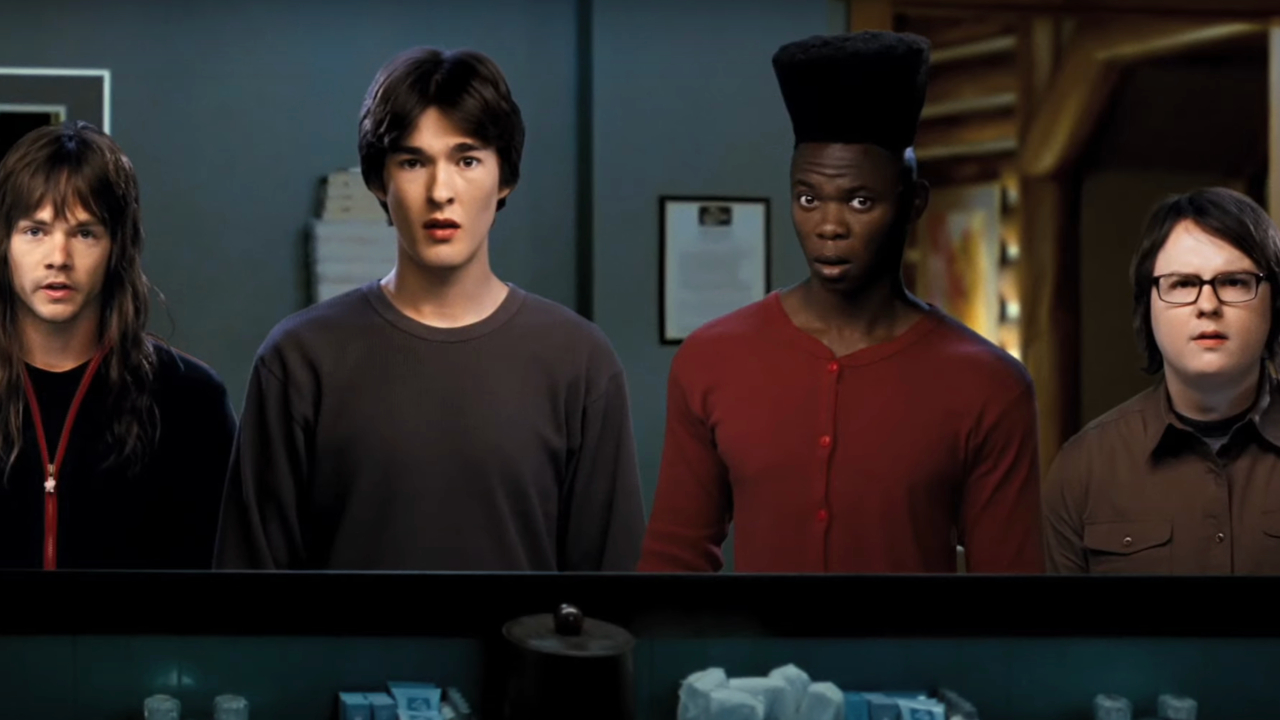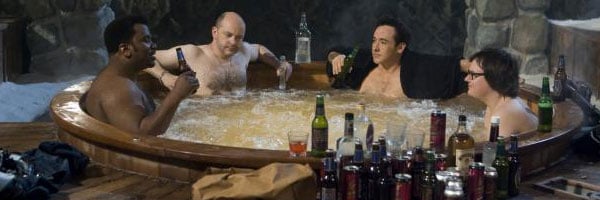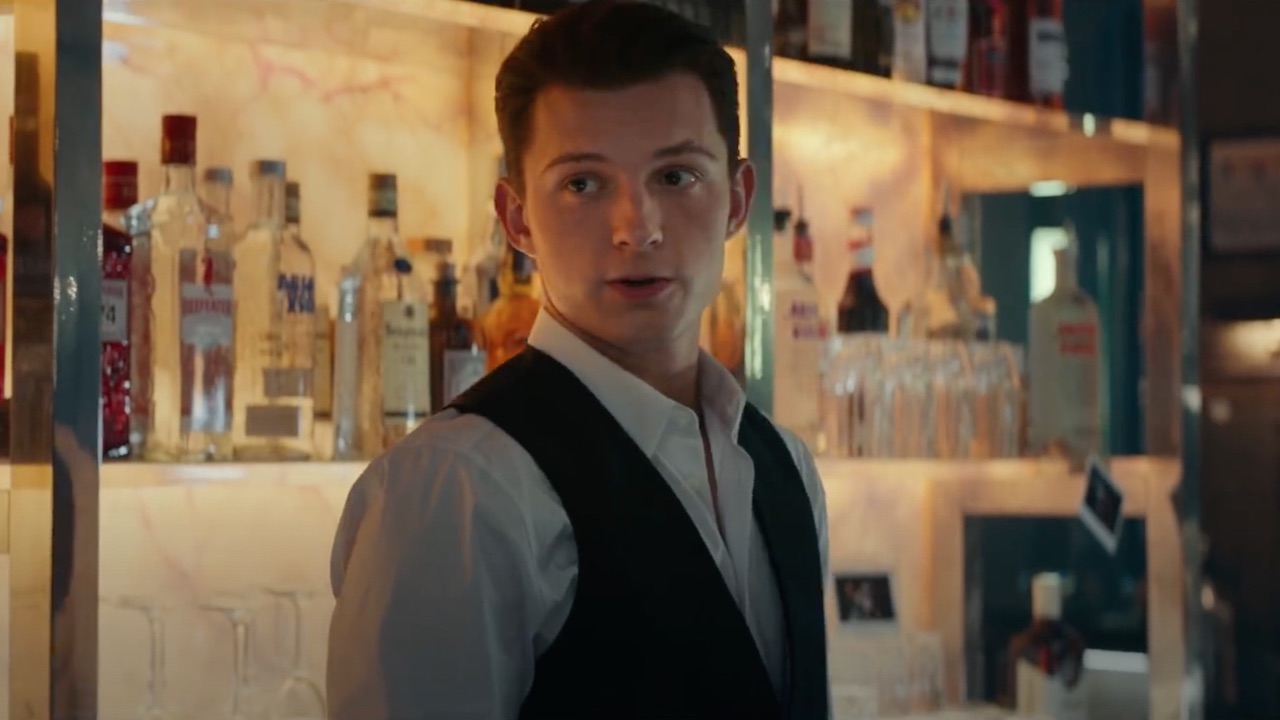Interview: Hot Tub Time Machine Director Steve Pink

Steve Pink had his hands full on the set of Hot Tub Time Machine, in a good way. Not only was he working with a brilliant concept – four guys traveling back in time via hot tub – but he also had four downright hilarious lead actors at his disposal. Pink and John Cusack go way back and share a production company called New Crime Productions. By uniting his buddy and business partner with the likes of Craig Robinson, Rob Corddry and Clark Duke, then tossing in some Chernobyl, booze, a squirrel and, of course, a hot tub, Pink established a recipe for comedic hilarity.
But that’s not even the least of it. Pink also had a fantastic list of supporting cast members including Crispin Glover, Chevy Chase and, his leading ladies, Collette Wolfe and Lizzy Caplan. Top that all off with a set saturated with 80s nostalgia and you’ve got a seriously entertaining throwback.
The guy behind Accepted is back and with an R-rated vengeance nonetheless. Who knew a notch up on the MPAA ratings scale could make such a difference? And that’s coming from someone who truly enjoyed Accepted. Pink delivers big time with Hot Tub Time Machine. Between the movie, this roundtable, some one-on-one time and a chance to party with Pink at the junket in Lake Tahoe, I’m eager to see what the director has up his sleeve for the future. In the meantime, I’ll be going for a second helping of HTTM.
Crispin Glover said you never spoke to him about casting him as an homage to Back to the Future. Was that part of why you cast him?
Well, it’s both right? He’s a great actor and he’s hilarious and iconic. Not only Back to the Future, but all of his other work from that time was really important to me. So he’s just one of my favorite actors, period. It did not escape me that he’s in the most famous and successful time travel movie and the idea of bringing him in to do this movie was a really great concept. That being said, the way we treated most of the characters in the movie, we just didn’t call attention to it. He gets to play an independent character of his own and it’s not important to reference the past. The past takes care of itself, right? It’s Crispin Glover in the flesh. That’s William Zabka too. We could have had him come in and play the Karate Kid kid and then you would have really known. I didn’t want to put all my chips on people knowing who he was because what if he’d come in as Johnny and – I don’t know how many people saw Karate Kid that many years ago. And he’s a good actor, right? For him to just play his own version of Rick the fucking club douche and then not call attention to his other characters. If you get that it’s Zabka it’s great, if you don’t, then great. That’s not important because I still have to make the scene work on its own.
We tend to juggle a lot, like these references, but most importantly, of course, it just had to be good and funny on its own, period. If it had just been a parody movie in which we’re like, ‘Hey, please enjoy and laugh at all of these references,’ you would have been bored out of your fucking skull.
The film embraces the 80s, but, in a way, pokes fun at modern times particularly with all of the ‘silly’ things we have now, like Chernobyl. As far as the 80s, there are some ridiculous things, but it’s not a constant parody.
Your Daily Blend of Entertainment News
To me, always the most important is you want to really like the characters because the more you like the characters, the more everything’s funny. Anthony Michael Hall in Sixteen Candles, I watched it recently with family and I hadn’t seen it in a long time and he’s incredibly annoying for the first 40 minutes of the movie. And then, without changing a single thing he’s doing, you start to laugh at everything he does. So you’re an hour into that movie and he hasn’t changed anything and he’s suddenly extremely funny because you’ve grown to like this weirdo who’s extremely annoying and he kind of grows on you. And because he grows on you, he’s just more enjoyable. If you don’t go along for the ride with the people who are having to manage these ridiculous circumstance they’re in, then you’ll be bored out of your mind because then you’re just relying on something to be funny and as soon as it’s not funny anymore, you’re bored. That’s a bummer.
Also embracing the 80s, I was kind of like, let’s embrace the 80s but let’s let the characters decide what they think about the 80s themselves. Obviously, some of them liked them more than others. Lou liked them, John’s character, Adam, hates being in the 80s. That was a terrible time for him apparently. But for Rob’s character, Lou, it was a great time. So I want to say that about all decades too. It’s not like all the decades are one thing. You can’t look back and say as a country, it was one thing for everybody because it’s not. And I liked having Clark. He’s a smart dude. Having him as an actor and as a character in the movie to be the commentary that lets us see the distinctions between the present and the 80s, he just did really subtly and really well.

What about casting Chevy Chase?
We all wanted him. The idea came up and we’re like it would be an incredible thing to have him and I think John had known him from just being out and about in Hollywood and called him up and asked him. And that’s how we got him to do it. That’s my understanding. [Sarcastically] He auditioned and he didn’t win the role in the room really. He had to come back a couple of times. I had him work on some things and eventually he got it. [Seriously] I actually think he’s a little underutilized in the film because you really want more set pieces. The role as written had all of this promise and then we just had such little time, so I actually think he’s a little underutilized. As great as he is in the movie, I want more Chevy, frankly.
SPOILER ALERT
The film leaves you with an interesting question because when they return to the present everything is changed, for the better. The problem is, they didn’t really earn it. Is it satisfying to walk into a brand new life like that?
That’s an interesting moral question. First of all, you have to adjust the paradox of time travel because you can’t just say he didn’t earn it because he was living it paradoxically in real time, while he was time traveling, right? So if he looks back at the pictures you see him married, so he was living and his parallel self was living in real time. So, in fact, he did earn it, so you can’t say he didn’t earn it because he did earn it. You always existed in two places at once. That’s the paradox of time travel, right?
But he doesn’t remember anything.
No, right. He doesn’t remember earning it, so that’s what I’m saying. It’s just kind of a paradox. You said moral. I didn’t say moral, you said moral. So from a moral point of view, if I’m the guy who walked into these new circumstances, I can’t say I didn’t morally earn it because my parallel self did, I didn’t. So now you’re saying, okay, could you argue that morally or from an earning point of view, as you put it, did I earn the life that I’m walking into? The version of myself that time traveled, I guess you can argue did not, but the version of myself that lived it in real time did. So that would be my answer. I think I wrote the line where he says, ‘Was it wrong to exploit my knowledge of the future for personal gain?’ No! Am I saying in this movie that if you become rich, the only way to be happy is to become rich so you should go back in time and become rich? No. For Lou, yes. For Lou, he needed to be really rich to be happy. I’m not making a general statement; I’m saying that that character Lou who was out of his fucking mind found satisfaction and, in this case, was a better person. He has a family, he’s nice to his family. He’s a better person and he likes the riches that decision brought him. Craig’s character’s not that way at all. He’s morally conscious of the piece. He just wanted to have the kind of satisfying life that he deserved.
END SPOILER
Have you given any thought to the possibility that this film could be a huge success? Would another one come next?
I’m superstitious so I don’t. I said in the other room that if I was just riffing, they went back to one place, so I thought, well, Bill and Ted-ing. Wouldn’t it be great if they could jump in and then be in medieval times and then jump in and be in the American Revolution or jump in and be in the future? A lot of time travel movies do that, right? And so they exploit that framework of a time travel movie, you know? I don’t know. Whatever. I’d have to think of one. Lou’s medieval self possessed the secret orb – I don’t know! It’d just be really great to exploit the other time travel structures that are available that we didn’t really get to because we only got to one period of time and then what stories can come from that. And I was far more interested in this time travel stuff than I was able to express.

Time travel is really big lately because of Lost and some other stuff. Is time travel just in the popular conscious now?
Yeah, I guess. It kind of always has been though, right? You’re right, it’s because of Lost it’s so big I think and many people are embracing it in mainstream ways as opposed to just thinking of it as a gimmick. Twilight Zone did it beautifully as well. You’re right in terms of today, popular ideas from time travel. God, I wish I could remember this book – Rob Corddry gave me a book to read, which was really really good about time travel and the NPR happened to have a segment about time travel when we were shooting and there was this guy who had mathematically proved you can time travel and stuff like that. He had written a book about it and written this equation.
How often does the mechanics of time traveling get in the way of the comedy? Do you ever have to just forget the facts and stick with the funny stuff?
All the time. It always gets in the way of the comedy so, you know, when in doubt, throw out the fucking time. What’s gotta go? We’re thinking something’s gotta go and it’s not going to be the comedy. So you’ve got to throw out the time, but for sure, all the time. Comedy’s king. And then you can say, who knows anyway? Like time travel, are you kidding me?
What was the balance between the script and the improv done on set?
I think there’s this myth of improv that goes like this: Hey, we’ve got all this money and we got a camera, let’s put on a show! Right? Let’s just fucking make a movie because we’re so smart and so funny that we can just fucking say whatever we want and it’s going to be awesome and the audience is going to enjoy it because we are comic gods. I read in the paper all the time, they say, ‘The film was largely improvised.’ Like, no it wasn’t. ‘Largely improvised’ means they’re like we have a ball of string and we have some old gum wrappers and we’re going to fly to the moon. You don’t MacGyver it, so basically the answer is, once you have a very specific set of circumstances that tell all of these little things, the character beat, the story beat, plot beat, whatever it is, right? And then the comedy that expresses those ideas in each scene telling the story, then you have the dialogue that tells that story and then you take off from there. And because those guys are such brilliant improvisers, they’re able to embrace whatever circumstance they’re in and play that circumstance and then it becomes improvisation.
How much of the budget went to the soundtrack? You have a lot of fantastic and iconic songs on there, I’d imagine that’d cost quite a lot to put together.
The studio supported the music budget really really well and they knew that it was going to be significant. I think we still were able to make it affordable because a lot of people, like the musicians, were really good about giving us the music and not killing us either. Believing in the process to a certain extent always helps make things more affordable and we knew we had to deliver that. I’m a music geek, I still miss a lot of stuff that could be in. I think we have a really good spectrum from Public Enemy to The Replacements to New Order to David Bowie to the Bunnymen, Motley Crue and Poison. That’s a pretty full spectrum of genre from the 80s, but there’s still some left out. Hopefully people will go, ‘Oh, I remember that song’ and then go listen to it.
How’d you settle on the song ‘Let’s Get It Started?’ It’s sort of the ‘Johnny B. Goode’ in this movie like it was to Back to the Future.
‘Johnny B. Goode’ rip off? Is that what you’re saying? What were you referring to sir? [Laughs] I just loved the song. You try and find a song, in my view, that you’ll listen to next year and like. So it had to be a current enough song and have a different enough production in terms of the way music is produced and I think Black Eyed Peas is unique in the way they produce their music and they’re really great at the way they produce their songs and the songs sound very current. It’s not the sound that you heard then, so that was one aspect of it. And then the other aspect of it was that it was a good enough song to last a little while. I personally think it’s a genuinely good song and will have legs for a long time because it’s just a great song. So, to me, they were a good choice.
Staff Writer for CinemaBlend.

